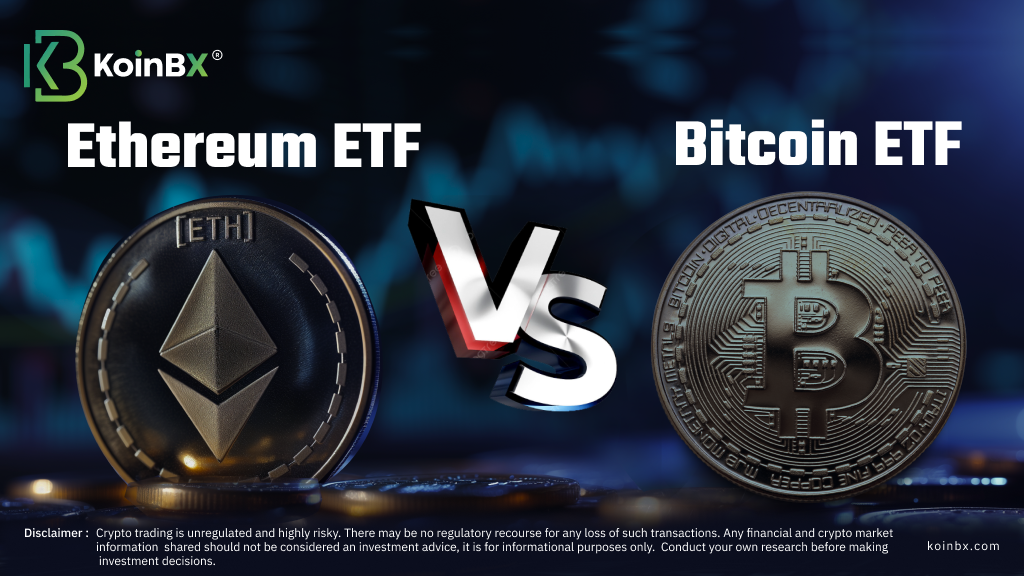The race for crypto assets goes never-ending, and along with it, the investment opportunities for savvy investors grow. Among the latest trends are Bitcoin and Ethereum ETFs, which offer a way to gain exposure to these popular digital assets without directly buying and managing them. These ETFs bring the world of crypto assets closer to traditional financial markets, making it easier for more investors to participate. But what exactly are these ETFs, and how do they work? Let’s explore the details and explore the key differences between Bitcoin ETFs and Ethereum ETFs.
Definition and functionality of ETFs
An exchange-traded fund (ETF) is a collection of various investments like stocks or bonds. ETFs let you invest in many different securities at once, often with lower fees compared to other types of funds. They are also easier to trade. The assets within an ETF are owned by the fund provider, who creates a fund to track its performance and sells shares of this fund to investors. As a shareholder, you own a portion of the ETF, but not the actual assets within the fund
If you invest in an ETF that tracks a stock index, you might receive dividends or have them reinvested from the companies in that index. Here’s a simple explanation of how ETFs work:
- An ETF provider selects a group of assets, such as stocks, bonds, and commodities, and creates a basket of these assets, each with its own ticker symbol.
- You can buy shares in this basket just like you would buy shares in a company.
- ETFs are traded on an exchange throughout the day, just like stocks.
What is Ethereum ETF
An Ethereum ETF is a financial product that follows the price of Ethereum. It allows you to buy and sell shares on traditional stock exchanges. This regulated investment option makes it easy for you to invest in the crypto market without having to manage digital assets yourself. The ETF reflects the performance of Ethereum, giving you exposure to its value without the hassle of owning it directly.
Operating within the rules of traditional financial markets, an Ethereum ETF provides a safe and regulated way to invest in crypto assets. This regulatory oversight boosts investor confidence and ensures the investment meets established financial standards.
Do you want to understand more about Ethereum ETFs? Read Here
Pros of Bitcoin and Ethereum ETFs
- Accessibility: Provide a regulated and more accessible way for traditional traders to participate in Bitcoin and Ethereum markets.
- Liquidity: Attract more capital and increase liquidity, potentially leading to greater price stability and reduced volatility.
- Legitimization: Contribute to the mainstream adoption of crypto assets by integrating them within traditional financial markets.
- Convenience: Allow investors to gain exposure to crypto assets without managing digital wallets.
- Long-term Holding: Spot ETFs create the opportunity for long-term purchase and holding of the underlying assets.
Cons of Bitcoin and Ethereum ETFs
- Price Correlation: The value of ETF shares can fluctuate significantly with the price of Bitcoin or Ethereum.
- Tracking Errors: ETF shares might not always track the price of the underlying crypto asset accurately, sometimes trading at a discount or premium.
- Research and Risk: Traders need to conduct thorough research and consider their risk tolerance before investing in these ETFs.
Final Thoughts
In stepping forward with crypto adoption, Bitcoin and Ethereum ETFs represent a significant step toward integrating digital assets with traditional finance. These ETFs offer a regulated, convenient way to invest in crypto assets, potentially attracting more institutional and retail investors. While they present exciting opportunities, it's crucial to understand the risks involved and conduct thorough research before diving in. By staying informed and considering your investment strategy carefully, you can make the most of these innovative financial products.
Download KoinBX Android App | Download KoinBX iOS App
Disclaimer: Any financial and crypto market information shared should not be considered investment advice. It is for informational purposes only. Conduct your own research before making investment decisions. Crypto trading is unregulated and highly risky. There may be no regulatory recourse for any loss of such transactions.






Comments